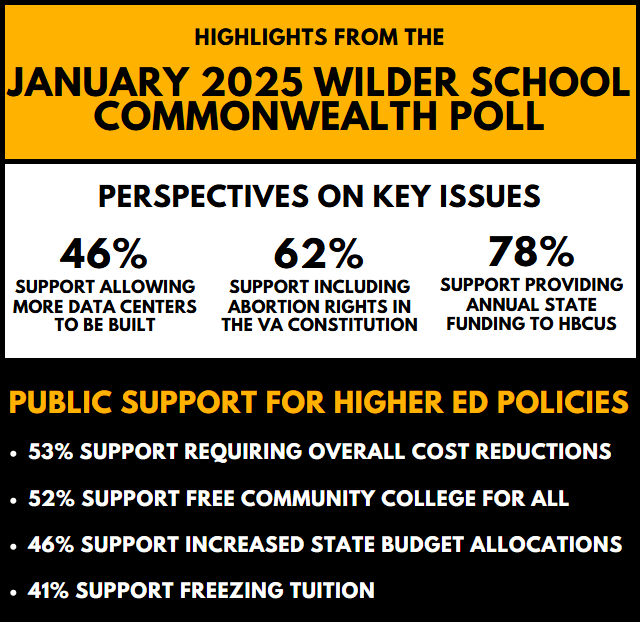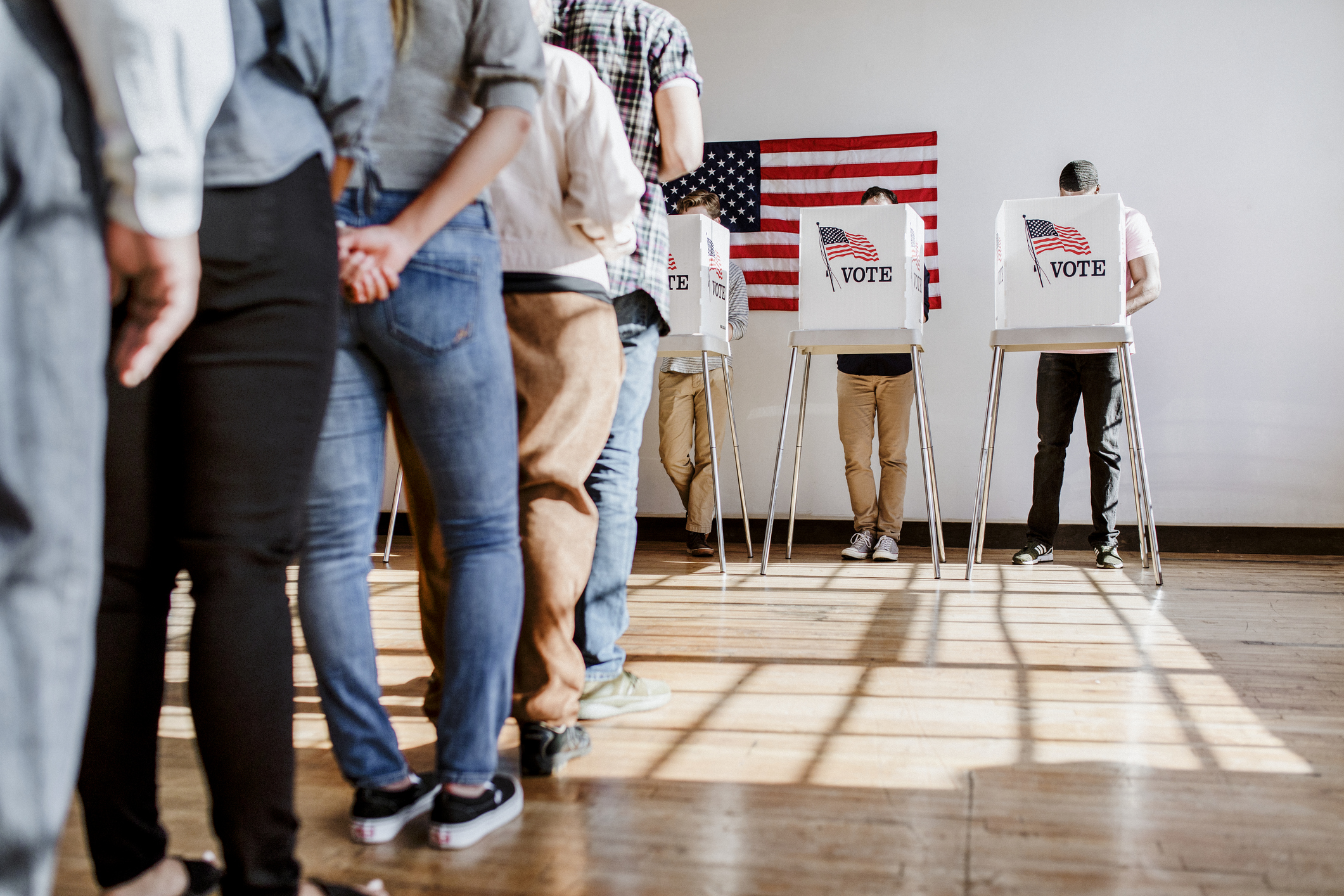CONTACTS:
L. Douglas Wilder
Distinguished Professor
Phone: 804-827-0776
Email: ldwilder@vcu.edu
Robyn McDougle
Associate Dean of Research and Outreach
Phone: 804-721-6703
Email: rdmcdougle@vcu.edu
Nearly 8 in 10 Virginians support HBCU funding; 69% oppose university presidents serving on governing boards.
RICHMOND, Va. (Feb. 5, 2025) - Today, the L. Douglas Wilder School of Government and Public Affairs at Virginia Commonwealth University released findings on key policy issues from its latest Commonwealth Poll, conducted between Dec. 18, 2024, and Jan. 15, 2025.
Access the full results of the Commonwealth Poll
Abortion rights
Over 60 percent (62%) of Virginians support including the right to an abortion in the Virginia Constitution. Following the overturning of Roe vs. Wade, Democrats in the Virginia Senate and House of Delegates are leading the charge to change the Virginia Constitution to enshrine abortion rights. If the amendment passes the General Assembly this year, it must be reconsidered by the 2026 General Assembly. Virginia’s constitution requires that any constitutional amendment be approved in two legislative sessions with an election in between. The House of Delegates’ 2025 election would serve as such an intervening election. Given the strong support for the amendment, abortion rights are likely to be a key issue in this November’s campaigns.
Support for Historically Black Colleges and Universities (HBCUs)
“I think the results show, as usual, that the people are still ahead of the elected officials. The poll indicates that an overwhelming majority of the people support funding for Virginia’s Historically Black Colleges and Universities. Gov. Youngkin opposes that. Republican Attorney General Jason Miyares has written an official opinion deeming aid to ‘private institutions’ appropriate and necessary, in several instances. Gov. Glenn Youngkin has opposed that. A majority of those polled do not agree with Youngkin.”
-L. Douglas Wilder, 66th Governor of Virginia
In 2022, the Virginia Attorney General released an official opinion allowing the state to fund Historically Black Colleges and Universities (HBCUs). Nearly eight in ten (78%) respondents approve of HBCUs receiving annual state funding for operating expenses. Democrats showed the highest approval (92%), while over 60% of Republicans and 76% of Independents also expressed support.
Respondents were also asked whether they believe Governor Youngkin has adequately funded HBCUs during his administration. Among the 49% of respondents with an opinion on the issue, 27% agreed that Younkin has provided appropriate funding, while 22% disagreed. Republicans (35%) and Independents (29%) were more likely to say Youngkin has appropriately funded HBCUs compared to Democrats (18%).
Two Virginia HBCUs — Hampton University and Virginia Union University — are private institutions, founded during Reconstruction to serve African Americans largely excluded from higher education at the time. Private colleges and universities in Virginia typically do not receive operating funds from the state. Advocates have called for public funding for Hampton and Virginia Union to address broader disparities among HBCUs. Respondents were asked whether they supported or opposed the governor and appropriations chair’s decision not to provide operating funds for these two institutions. Results were split, with 47% agreeing that no funds should be allocated, while 43% believed funding should be provided. Support for withholding funding was highest among Republicans (65%), followed by Independents (42%) and Democrats (32%).
L. Douglas Wilder, the 66th governor of Virginia, said, “I think the results show, as usual, that the people are still ahead of the elected officials. The poll indicates that an overwhelming majority of the people support funding for Virginia’s Historically Black Colleges and Universities. Gov. Youngkin opposes that. Republican Attorney General Jason Miyares has written an official opinion deeming aid to ‘private institutions’ appropriate and necessary, in several instances. Gov. Glenn Youngkin has opposed that. A majority of those polled do not agree with Youngkin.”
Public perceptions of college education

When asked about the value of a college education, Virginians were divided. A near-equal split emerged between those who believe college remains an essential factor in an individual’s future success (43%) and those who feel its importance has declined (44%). Only 11% of respondents think that college education is of minimal value to future success.
More than half of Democrats (55%) and Independents (53%) believe in the continuing value of college education, while (54%) of Republicans say they once valued college highly but now see it as less essential.
On the cost of higher education, a majority (54%) disagreed that the price of a four-year degree at an in-state Virginia university is “worth it,” while 42% agreed. Democrats were the most likely to say the cost is justified (45%), followed by Republicans (40%) and Independents (33%). These findings closely align with the VCU Wilder School’s August 2024 Commonwealth Poll.
Virginians were also asked about strategies to improve college affordability, selecting multiple options:
- 53% support requiring universities to reduce overall costs.
- 52% favor providing free community college for all students.
- 46% support increasing state budget allocations for higher education.
- 41% favor freezing tuition for an extended period.
Democrats (67%) and Independents (51%) largely support free community college, while Republicans (60%) favor mandating cost reductions at Virginia universities.
University presidents serving on governing boards
Recently, the Joint Legislative Audit & Review Commission (JLARC) recommended that university presidents should not serve as the chairs of their institution’s health systems board due to conflicts of interest. Building on this recommendation, the Commonwealth Poll asked whether university presidents should be barred from serving on any university governing board. Seven in ten Virginians (70%) agreed that university presidents should not serve on governing bodies, while only (18%) believed they should be allowed to do so.
General Assembly issues: Data centers in Virginia
JLARC also recently released a report examining the impact of data centers in Virginia. These facilities, used for digital data processing, storage and networking, have become a major economic driver for the state. However, some argue that Virginia may struggle to meet the rising energy demands required to demand them.
With multiple bills before the 2025 General Assembly addressing data center expansion and regulation, Virginians were asked whether they support allowing more data centers in the state. Opinions were mixed, with 46% agreeing that Virginia should allow more data centers, while 39% opposed expansion. Support was strongest among Republicans (48%) and Democrats (47%), while Independents were less likely to support growth (36%).
###
About the L. Douglas Wilder School of Government and Public Affairs at VCU
Ranked in the top 15% of graduate schools of public affairs in the nation by U.S. News and World Report, No. 39 in the top 40 Graduate Schools of Public Affairs, No. 6 in Homeland Security Programs and No. 33 in Public Management and Leadership Programs, the L. Douglas Wilder School of Government and Public Affairs at Virginia Commonwealth University advances excellence in governance and promotes evidence-based public policy in Virginia and beyond. The school offers an array of graduate, post baccalaureate and doctoral programs in virtually every policy area including criminal justice, homeland security and emergency preparedness, public administration, public policy and administration, and urban and regional studies and planning. Additionally, the Wilder School is home to a robust Centers and Institutes for Public Policy that provides applied research in the areas of state and local government, social equity, and leadership and a range of services to clients in state and local government, nonprofit organizations, businesses and the general public. Learn more at wilder.vcu.edu.
About VCU and VCU Health
Virginia Commonwealth University is a major, urban public research university with national and international rankings in sponsored research. Located in downtown Richmond, VCU enrolls more than 28,000 students in more than 200 degree and certificate programs in the arts, sciences and humanities across VCU’s 12 schools and three colleges. The VCU Health brand represents the VCU health sciences academic programs, the VCU Massey Comprehensive Cancer Center and the VCU Health System, which comprises VCU Medical Center (the only academic medical center in the region), Community Memorial Hospital, Tappahannock Hospital, Children’s Hospital of Richmond at VCU, and MCV Physicians. The clinical enterprise includes a collaboration with Sheltering Arms Institute for physical rehabilitation services. For more, please visit vcu.edu and vcuhealth.org.
About the VCU Commonwealth Poll
For nearly three decades, the VCU Wilder School Commonwealth Poll within the Centers and Institutes for Public Policy has been an important bellwether for policymakers in Virginia and beyond on a range of topics, including voting intentions, economic and workforce development, education, housing, public health, public safety and racial equity. The Commonwealth Poll was recognized as a CNN-cited poll during the 2024 election cycle, adhering to a rigorous review of methodologies and assumptions that ensure all CNN-cited polling entities meet the gold standard in public opinion research.
Methodology
The Winter 2024 Commonwealth Poll, sponsored by Virginia Commonwealth University, obtained telephone interviews with a representative sample of 806 adults, ages 18 or older, living in Virginia. Telephone interviews were conducted by landline (201) and cell phone (605, including 441 without a landline telephone). The survey was conducted by Responsive Management. Interviews were conducted in English from December 18, 2024, to January 15, 2025.
In telephone survey research, design weights are often employed to reduce bias, correcting for differences in the probability of selection due to non-response and non-coverage. The sample was weighted to match Virginia’s adult population, which was the primary sampling unit. Two sampling frames were employed: one frame representing those with a listed landline and a second frame consisting of RDD cellular numbers. A two-stage weighting procedure was used to weight this dual-frame sample. Weighting was accomplished using the Anesrake package, which implements the American National Election Study (ANES) weighting algorithm. The margin of error for the entire sample is ± 4.73. A combination sample consisted of a listed landline sample and a cellular random digit dial (RDD) sample to represent all adults in Virginia who have access to a listed landline or cellular telephone. Both samples were provided in their proper proportions according to state telephone type usage by Marketing Systems Group, a leader in providing research-based statistical samples. The cellular RDD sample was prescreened for disconnected numbers.
As many as seven attempts were made to contact every landline telephone number, and as many as five attempts were made to contact each cell phone number. Calls were made at different times of day and different days of the week to maximize the chance of contacting potential respondents. Each telephone number received at least one daytime call when necessary. In addition to the five attempted phone calls for each cell number, cell numbers that were not reachable in five attempts were sent a message via Short Message Service (SMS) with one final request to participate in the study. The SMS message contained a link that would lead the respondent to the internet survey. Of the 605 surveys completed with cell samples, 33 were completed using the link provided in the SMS message. For the landline sample, the computer questionnaire instructed interviewers to ask to speak with the youngest adult currently at home. Selecting respondents in this manner has resulted in data that closely mirrors the population's age when combined with cellular sampling. For the cellular sample type, interviews were conducted with an adult who answered the telephone. Response rates were computed according to American Association for Public Opinion Research standards. Thus, the response rate for the landline sample is 6.4 percent. The response rate for the cellular sample is 8.9 percent.
.jpg)

.jpg)
